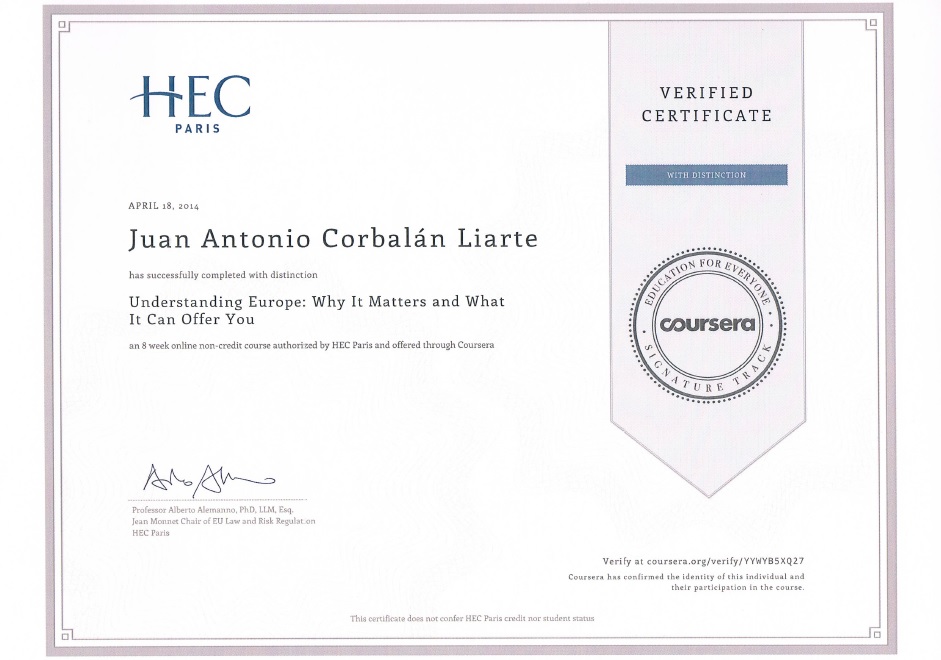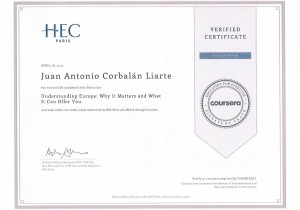
The EU Paradox
Since the first milestone was put in 1950, with the Schuman Declaration (1), Europe has been changing a lot of things. The European integration process is a very good example in the world in order to increase the opportunities of the citizens and business people. However, there are many people in Europe who think that EU is not a very good idea. This is the EU paradox and, in my opinion, it is a normal consequence due to several reasons.
Historically, in almost every important change in countries, cities or groups of population are always people in favour and in against. For instance, in many cities of Spain there is an expansion of the pedestrian areas in the centre of the cities: in general, citizens are in agreement but business people who have their shop or company in the same place are normally against (2). Mainly, this is due to the fact the decrease of the sales when the constructions of these pedestrian areas take place and then, the possibility to lose customers in their areas.
As far as I am concerned, the EU paradox is almost the same example but much more difficult to understand it. In this important process to become a huge economic and political union, there are people or lobbies against because they are going to lose power. And they use their means, like newspapers or other media in order to confuse people. We can see this phenomenon in almost every country in Europe (3). Another example in Spain: during this terrible crisis with unemployment close to 30%(4) (5), there are experts and politicians who explain to the population the following: If Spain left EU, the country could depreciate the currency to earn competitiveness in the world and Spain could low the unemployment rate (6). But, in my opinion, they had to explain to us all the rest of consequences about not to belong to the euro or the European Union anymore.
As I explained before, in this process parliaments of the countries and regions are losing power to decide their own decisions. And at the same time, EU parliament and European Commission are earning power. Consequently, there are regional groups of people against because of this loss of power to decide. Although in general, these changes are better for citizens, there can be companies against because, for instance, they prefer not to be regulated by EU policies. In this point, we could see a good example with banks in Spain. Until 2011 approximately, banks in Spain and Europe didn’t have any problems with their governments. Since 2011, banks have been doing a lot of changes in their accountancy in order to be profitable and not to be a problem for their countries and citizens (7).
On the other hand, European Union is less popular among its young citizens. In my opinion, the main reason is the huge unemployment rate among this population (54,6% in Spain) (8). They can think that politicians in Europe could do more things in order to solve this important problem. Consequently, they are more exposed to the drastic solutions of several politicians about leaving Europe in order to earn competitiveness in the world.
To sum up, I believe that European Union has, on the whole, a positive influence in its society and industries. It has very good programs to develop the continent in a large variety of fields: Erasmus or Leonardo Program in education, European Regional Development Fund in infrastructures (9)… In spite of the fact that, EU only manages 1% of the budget in the EU, its programs are very popular in the society (10). In my opinion, it could be a good idea to develop special programs in order to low the unemployment rate in the first place. Secondly, to develop other programs in order to increase the mobility and the prosperity of the citizens in Europe. Thus, the EU paradox can decrease or disappear in the next future.
Juan Antonio Corbalán
Article made it in 2014 obtaining a certificate of the following course: «Understanding Europe: Why It Matters and What It Can Offer you» from HEC Paris from Coursera.org.

1. Video Lecture 1-3. What is Europe: the birth of Europe. Course Understanding Europe: Why It Matters and What It Can Offer You. HEC Paris.
2. http://www.diariodelanzarote.com/noticia/los-comerciantes-recelan-de-la-peatonalizaci%C3%B3n-%E2%80%9Cse-ve-menos-movimiento-y-viene-menos-gente%E2%80%9D
3. http://www.bolsamania.com/noticias-actualidad/pulsos/El-26-de-los-alemanes-quiere-salir-del-euro-en-un-duro-reves-para-Angela-Merkel–0720130311165341.html
4. http://www.aprendemas.com/Noticias/html/N13663_F03032014.html
5. http://www.rtve.es/noticias/20130918/30-espanoles-apuesta-dejar-euro-volver-peseta-segun-estudio/747340.shtml
6. http://www.expansion.com/2013/05/06/economia/1367870531.html
7. http://www.expansion.com/2013/11/15/empresas/banca/1384533914.html
8. http://www.aprendemas.com/Noticias/html/N13663_F03032014.html
9. http://europa.eu/legislation_summaries/agriculture/general_framework/g24234_es.htm
10. Video lecture 1-7. Debunking some of the European myths. Course Understanding Europe: Why It Matters and What It Can Offer You. HEC Paris.